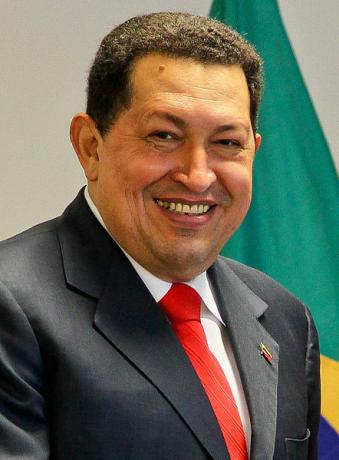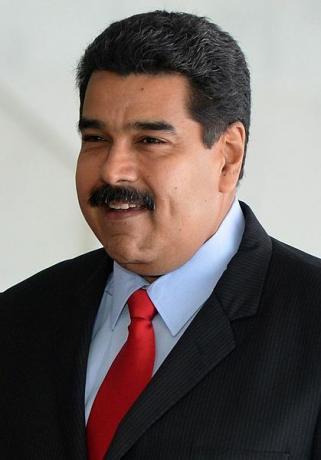
Economic recession, skyrocketing inflation, devalued minimum wage, instability in the political scene, extreme violence, accusation of death and torture to opponents, food shortages, and “kidnapping of rights” are some of the items that make up the The worst crisis in Venezuelan history.
The country borders two Brazilian states, Amazonas and Roraima. It was the migratory crisis in the second that made Venezuela's instability stand out in the news in Brazil.
see more
Scientists use technology to unlock secrets in ancient Egyptian art…
Archaeologists discover stunning Bronze Age tombs in…
Fleeing the disastrous situation in the country, more than 2.3 million Venezuelans have already left the territory, according to data from the International Organization for Migration. Asylum requests from neighboring countries gained even greater proportions from 2015 onwards.
According to a BBC report, published on August 25, Brazil alone, by April 2018, had already received more than 50,000 Venezuelan immigrants, coming mainly through the border area of Roraima. This number represents an increase of 1000% compared to 2015.

But the migratory wave is not restricted to our country. Other neighboring nations such as Peru, Colombia and Ecuador have also received and are still receiving thousands of refugees. Some points, such as the city of Tumbes, on the border between Ecuador and Peru, receive up to 3,000 Venezuelans a day.
In response to the growing number of immigrants, these countries are, every day, tightening inspection and control of the entry of Venezuelans. In Brazil, for example, the state of Roraima tried to close the border, but was stopped by the Justice.
The tension is growing and gaining alarming proportions every day. In August 2018, concern increased when, in a violent conflict, Brazilians burned clothes and belongings of immigrants. The tragic situation ran all the communication vehicles in the country.
At that moment, people who until then were oblivious to the collapse began to wonder what was happening in the neighboring country. To explain the situation, we made a historical overview of the crisis, so that you understand what is happening in Venezuela.
To understand what is happening in Venezuelan politics today, it is necessary to go back to 1999, when Hugo Chavez he was sworn in as president of the country, after winning the election in December 1998. At that moment, in addition to the scenario of instability, the South American country was going through a serious social crisis.
A campaign based on the fight against poverty, striving for social inclusion and income transfer, combined with the notoriety acquired over the years, were some of the points responsible for making Chávez quickly become a very popular.

At the head of the government, the president launched the Bolivarian Revolution, which began with a Constituent Assembly to rewrite the Venezuelan constitution. In a referendum, more than 70% of the population approved the document. Also in 1999, the “Enabling Law” was approved, granting extraordinary powers to the president.
Vehemently criticized by the opposition, it allowed the head of state to legislate on public services, infrastructure, security, finance, taxes and many others.
Taking the possibility of legislating matters of interest, decrees with the force of law entered into force before going through the Legislature, since the objective was to speed up the procedures administrative. It was through this mechanism that Chávez nationalized the oil sector, through the Hydrocarbon Law.
This law was followed by other decrees, whose enactment did not please various sectors of society, the Catholic Church, or the opposition. Even under intense demonstrations they were maintained. Furthermore, opponents began to accuse the president who wants to implement a communist regime in the country.
In 2002 the government suffered a coup d'etat. The failed attempt lasted just two days and Hugo Chávez was brought back to power by the military. The moment was decisive for him to harden his government towards Bolivarian ideals. While the opposition accused him of authoritarianism, government sectors defended him as a management for the poor.
In December of the same year, employees of the state oil company PDVSA started a strike against the regime. In response, more than 18 officials were fired and replaced by the president's most trusted men. This made the institution one of the pillars of power.
In 2008, during his third term, a constitutional amendment allowed Chávez to be elected for the fourth time, on the grounds that he needed more time for the socialist revolution come true. In fact, in 2012 he won the elections, however, he could not take office due to cancer. He passed away in March 2013.
Continuing Chávez's policy, his vice-president, Nicolas Maduro was elected in 2013. In a close election, he came to power for a full term. The moment was one of political crisis, which fell on the Venezuelan economy, which was also going through a crisis.

In this context, Maduro's popularity plummeted, giving way for the opposition to request a mechanism provided for by the Constitution, a plebiscite to revoke the president's mandate. There have been several attempts since 2016, as with the support of at least 20% of the population, he could be removed by power.
After several postponements made by the National Electoral Council, as of January 10, 2017, he began to serve the second half of his government. In that case, if he left power, his deputy would take over, overthrowing the opposition's purpose.
Why is Venezuela in crisis? In 2014, due to the drop in the price of a barrel of oil on the international market, the economy Venezuela, which is almost entirely based on the exploitation and sale of fuel, has entered a alarming crisis. Chávez's characteristic social investments were cut.
Basic items such as food and medicine began to run out. In addition, inflation reached unimaginable levels, which generated a wave of protests. More than 40 people died during the demonstrations. Political opponents and anti-regime militants were arrested. The Venezuelan government still defends today that this is an economic war subsidized by the elites and the United States.
Taking this scenario into account, the military began to have more voice in the government every day. And even though the opposition is a majority in Parliament, it cannot pass any of its decisions.
All are barred by the judiciary, which is fully controlled by Maduro. At the time, the Judiciary's justification was that the Venezuelan Parliament was in contempt, since three deputies accused of electoral fraud were sworn in.
In April 2017, the population mobilized in new protests, this time with greater death tolls, which already exceed 200, mostly young people under the age of 30. There are now more than 5,000 arrests, many of them arbitrary. There are also endless reports of torture.
Nicolás Maduro justified himself by accusing the opposition of plotting a violent coup d'état, and to prevent it, he activated a military plan. Civilians were tried in military courts, which for many critics is typical of a dictatorship.
In July of the same year, the president convened a Constituent Assembly, which was elected under accusations of fraud by the opposition. It was one more reason for street conflicts to increase.
In August, the constituents were sworn in, who then tried to remove attorney general Luisa Ortega. She made several denunciations in relation to repression in the streets, arbitrary arrests and the Constituent Assembly itself. She had already been suspended by the Supreme, accused of committing a management error.
In the same month, a decree was approved that gives permission for the Constituent Assembly to pass laws, what was formerly exclusive to Congress, where most members oppose the government of Mature.
In May 2018, under protests, and amid high abstention rates, fraud allegations, lack of recognition of the international community and boycott of the opposition, Nicolás Maduro was re-elected for another six years of mandate. A large part of his votes are credited to Hugo Chavez's loyal voters.
The scenario is not even close to calming down. The economy continues to decline, and in August 2018, with the five-digit removal of the already devalued bolivar, inflation should reach 1,000,000% this year.
On January 10, 2019, Nicolás Maduro took office for another six years of government, that is, until 2025. The president began the new phase at a time when the country is plunged into the most serious crisis in its history.
Maduro, as already mentioned, won the elections in May 2018.
The inauguration, for a long time, was seen as a path of no return in relation to the political, economic and institutional crisis that the Latin American country is going through. In other words, it is the culmination of the drift of the regime that, today, controls all spheres of political and judicial power.
And that's not all, the renewal of Maduro's mandate marks the break with the greatest powers in the international community: the United States, the European Union and neighboring countries, as is the case of Brazil.
The Venezuelan leader, on the other hand, finds support and allies in China, Russia, Mexico and Turkey. Even so, the economic agreements closed with these countries, so far, have had no effect in the face of economic chaos.
In South and Central America, the president has as allies the presidents Evo Morales, of Bolivia, Miguel Díaz-Canel, of Cuba and Daniel Ortega, of Nicaragua.
Instead of taking the oath in the National Assembly, as required by the Constitution, Maduro did so before the Supreme Court of Justice (TSJ). The main reason is that the Parliament elected in 2015 is made up practically of opponents. Therefore, it was declared contempt, that is, it no longer exists for the Government.
Since the inauguration date, diplomatic relations with at least 13 Latin American countries have been severed. The so-called Lima Group comprises, in addition to Brazil, Colombia, Argentina, Peru and Chile.
Among the measures imposed by the group is the ban on the entry into its territories of senior Venezuelan government officials, including Maduro himself.
Amidst the controversies of Maduro's inauguration, the, until then, little-known Juan Guaidó became one of the main opponents of Maduro.
In early January, he assumed the presidency of the National Assembly, the last state body controlled by the opposition to the government. On the 24th of the same month, he proclaimed himself president of the country, considering the government of Nicolás Maduro to be illegitimate.
The US government officially recognized him as “Interim President”. Soon after, Brazil, Colombia, Peru, Ecuador, Costa Rica, Chile and Argentina, in addition to the Secretary General of the Organization of American States (OAS), did the same.
Supported by Article 233 of the Constitution, Guaidó was publicly sworn in as president in charge of the country,
This article allows the Legislature to exercise functions when the position of the presidency is vacant. The objective is to achieve the formation of a “Transitional Government and free elections”.


